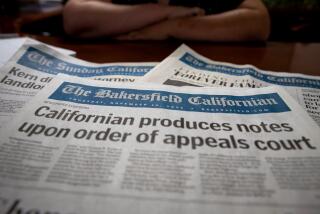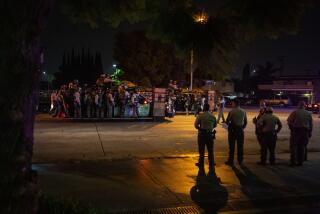An Easy Call, Mr. Ashcroft
- Share via
Each day that prisoner No. 13371-179 languishes in a federal jail in Houston further tarnishes Atty. Gen. John Ashcroft’s less-than-shiny reputation as a protector of this nation’s freedoms.
Almost six months ago, a Texas judge ordered Vanessa Leggett, an aspiring author and freelance journalist, locked up on contempt charges. Her crime was refusing to obey a federal grand jury subpoena demanding she turn over to a U.S. prosecutor notes and tape recordings of interviews she had conducted while researching a book she hoped to write about an infamous 1997 Houston homicide.
Leggett says she promised anonymity to many of those she interviewed. She went to jail rather than violate that trust and has lived behind bars, with drug dealers and thieves, far longer than most reporters who have followed the time-honored journalistic practice of resisting such subpoenas.
The case hinges on the issue of credentials. The prosecutor, eager to have Leggett help him do his job, says she is not affiliated with any news organization and thus is not a journalist. If Ashcroft had a better understanding of the 1st Amendment, he’d pick up the phone and tell his underling, “You’re not the one to determine that!”
Leggett, 33, had published only two pieces, one in an obscure magazine and the other in a law enforcement handbook. But respected organizations such as the New York-based Committee to Protect Journalists have not hesitated to embrace her as a member of the trade and blast the government for its arrogant assault on her rights.
Defining “journalist” is tricky. When people with ulterior motives pose as journalists--as CIA agents have done, as Al Qaeda operatives did in September in assassinating Afghan leader Ahmed Shah Masoud--it undermines the ability of legitimate reporters to do their jobs. In some nations, journalists must show credentials. Even in the U.S. there are scattered calls to license members of the Fourth Estate. But the power to decide who is a legitimate journalist is the power to censor, and that’s not something defenders of civil liberties are eager to turn over to anyone.
So journalists must define their fraternity broadly--even if that means including a few flakes. More important, prosecutors, courts and lawmakers must embrace this intentionally loose definition and extend all protections to these surrogates for the public--including a prohibition against agents of the state trying to coerce a journalist into becoming their involuntary private investigator.
Under federal law, the contempt finding against Leggett must be withdrawn when the grand jury that issued the subpoena disbands--which is supposed to happen Friday. Then the U.S. attorney’s office will have a choice: Seek another subpoena demanding Leggett’s reportage or listen to the journalists organizations calling for her freedom. Ashcroft is struggling with some hard calls on civil liberties these days. This isn’t one of them.
More to Read
Get the L.A. Times Politics newsletter
Deeply reported insights into legislation, politics and policy from Sacramento, Washington and beyond. In your inbox twice per week.
You may occasionally receive promotional content from the Los Angeles Times.







